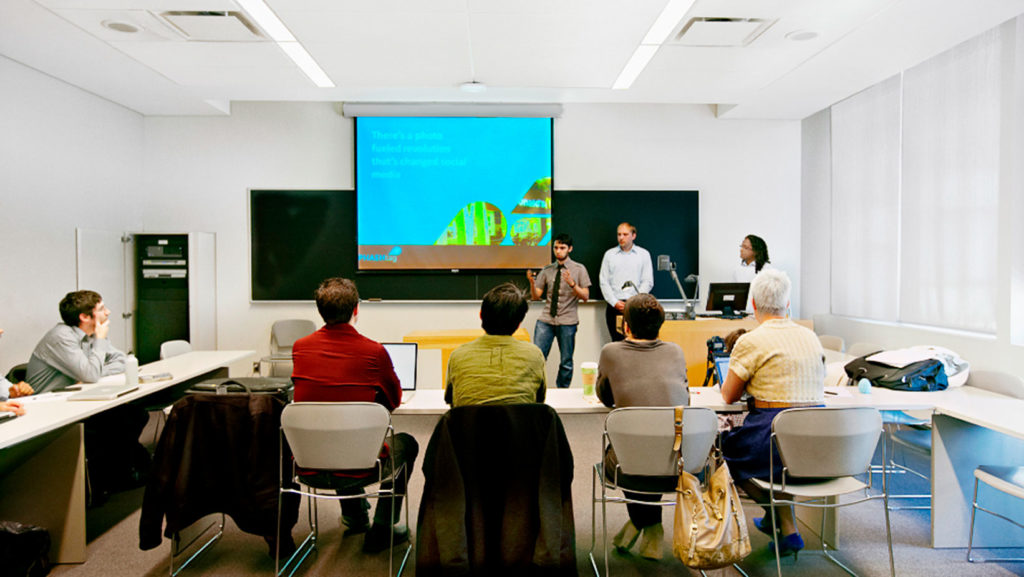Obtenez des bases solides en linguistique dans un cadre idéal : un campus multilingue et multiculturel situé dans l’une des villes les plus diversifiées du Canada. La linguistique est l’étude scientifique de la langue et de sa structure, y compris les sons, les mots et la grammaire. Le langage est le fondement de la société humaine et il influence les interactions dans tous les aspects de la vie. Notre programme Linguistique, langue et société est conçu pour vous aider à acquérir de solides connaissances académiques en linguistique et à comprendre l’effet de la langue sur la société.
Le programme se concentre à la fois sur les domaines essentiels de la linguistique et sur les interactions complexes entre la langue et la société. Il comprend des cours de base en linguistique et des cours spécialisés dans des domaines essentiels comme la communication dans des environnements multilingues, la politique et la planification linguistiques, la langue et la migration, la diversité linguistique, l’accessibilité des langues et les ramifications juridiques de la pratique linguistique.
Vous suivrez des cours dans différentes branches de la linguistique, notamment la phonétique (les propriétés sonores du langage), la morphologie (la structure des mots), la sémantique (l’étude du sens) et la sociolinguistique (les relations entre le langage et les contextes sociaux). Nos cours spécialisés vous permettront de comprendre comment la langue s’imbrique dans la société, la culture et les expériences individuelles. Ce parcours met en lumière la façon dont les sociétés utilisent les langues comme outils de communication, explorent les diversités linguistiques et prennent des initiatives pour préserver et revitaliser les langues menacées d’extinction. De plus, le programme souligne le rôle central que joue la langue dans le contexte juridique, ajoutant une dimension cruciale à votre compréhension de son incidence.
Dans le cadre du programme de Linguistique, langue et société à Glendon, vous bénéficierez de ressources linguistiques exhaustives au-delà de la salle de classe. Le Centre de recherche sur le contact linguistique de Glendon et le Musée canadien des langues offrent une expérience pratique. Par ailleurs, le programme de linguistique organise fréquemment des exposés et des conférences auxquels participent des universitaires de renom. Nous visons un engagement au niveau mondial, l’utilisation d’une technologie de pointe et l’amélioration de l’accès et de l’inclusion, en favorisant un environnement d’apprentissage collaboratif et basé sur la communauté.
Vous vous demandez à quoi ressemblera chacune de vos années d’études? Découvrez-le ici.
Les cours
Durant vos études, vous suivrez des cours qui vous proposent une approche rigoureuse et équilibrée de la linguistique, allant de cours de base, comme Introduction to Linguistics (GL/LIN 1603) et Phonetics(GL/LIN 2711), à des cours spécialisés qui vous plongeront dans une exploration des interactions complexes entre la langue et la société, la culture et les expériences individuelles.
Vous aurez également de nombreuses possibilités d’apprentissage pratique. Par exemple, Anishinaabemowin Language and Culture (GL/LIN 2626) comprend un travail avec la communauté ojibwée de Toronto et une fin de semaine d’aventure dans la nature pour utiliser l’anishinaabemowin. Le cours Field Methods (GL/LIN 4215) vous propose un travail individuel avec un locuteur d’une langue inhabituelle afin de recueillir et d’analyser des données linguistiques de première main. Quant au cours Linguistic Diversity in Canada (GL/LIN 4611), il vous permet d’acquérir une expérience pratique de la diversité linguistique dans l’une des villes les plus diversifiées du pays.
Remarque : Vous devez commencer par les cours de base. À partir de la deuxième année, vous pouvez suivre des cours spécialisés. De plus, le programme propose une série de cours du tronc commun de Glendon ouverts aux étudiantes et étudiants libres.
Voir les horaires des cours sur le site de l’Université York
Catalogue des cours

Types de diplômes et exigences du programme
Le Département de Linguistique, langue et société vous propose les baccalauréats et certificats suivants :
- Baccalauréat spécialisé B.A./i.B.A.
- Baccalauréat spécialisé avec double majeure B.A./i.B.A.
- Baccalauréat spécialisé avec majeure et mineure B.A./i.B.A.
- Baccalauréat spécialisé avec mineure B.A.
- Baccalauréat ès arts
Le Département de Linguistique, langue et société offre également une filière spécialisée dans les langues menacées, la documentation et la revitalisation des langues, ainsi qu’un baccalauréat international bilingue ou trilingue.
Prenez rendez-vous avec un conseiller académique
Consultez le calendrier académique pour les exigences du programme
Autres détails sur le programme
Prix étudiants
Nous voulons reconnaître votre réussite académique et votre engagement à l’excellence dans le programme de linguistique et sciences du langage. Les prix et les bourses ne sont pas seulement un coup de pouce financier, mais aussi un excellent moyen de montrer votre travail acharné sur votre CV et votre relevé de notes universitaires. Consultez la liste de prix disponibles, y compris le prix du Département de linguistique et sciences du langage.

Rejoignez le Club de linguistique de Glendon
Tirez le meilleur parti de votre séjour à Glendon. Rencontrez vos pairs, acquérez de nouvelles compétences et bénéficiez de soutien en rejoignant le Club de linguistique de Glendon. Ce groupe géré par les étudiants offre à la fois des événements sociaux (soirées cinéma et lunch pizza) et des événements académiques (planification des études et aide aux devoirs). Il propose une série d’ateliers avec des diplômés de Glendon qui vous donne l’occasion de poser des questions sur vos futurs parcours professionnels.

Rencontrez nos diplômés
Découvrez les carrières passionnantes de nos diplômés et diplômées et comment leur parcours à Glendon leur a donné un avantage sur le marché du travail.





